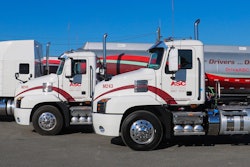Last-mile delivery carriers are speeding away from traditional health insurance. People want to work for employers that offer benefits — a Georgetown University survey found health insurance is one of the most important factors when considering whether to change jobs — but for drivers on limited incomes, employer-sponsored healthcare must also be affordable.
This poses a serious challenge for last-mile delivery carriers and delivery partners, many of whom are required by the retail giants they work for to offer health insurance. Group plans are often prohibitively expensive, and the overall group rate skyrockets if a single employee or one of their dependents has a medical emergency or requires specialized care. Plus, the large out-of-pocket cost of group plans for employees mean delivery partners have trouble meeting participation minimums.
Finding affordable healthcare is especially crucial for delivery partners. The owners of delivery partners companies are in a unique business where their growth is determined by a retail giant, and they can only truly control fixed costs such as auto insurance and workers' comp. It’s crucial for delivery partners owners to shop around for the best value for each of those fixed costs in order to protect their margins.
Fortunately for delivery partner owners, drivers, and the customers counting on same-day delivery, group health plans aren’t the only option. Many last-mile delivery carriers and delivery partners are turning to the individual coverage HRA (ICHRA), which allows employers to reimburse employees for plans purchased through the individual marketplace. These carriers have been able to provide employees with quality healthcare without taking on the enormous expense of group coverage.
Affordable benefits for drivers
Group health plans are a poor fit for delivery companies. The plans are too expensive, struggle to accommodate part-time employees, and have rigid participation requirements. Last-mile leaders don’t have the time to manage group plans, and the uncertainty of renewal costs threaten a balance sheet that they already have limited control over. Many companies see double-digit increases — a cost that few companies can weather.
With ICHRA, organizations escape the cycle of expensive plan renewals. In some cases, this model allows delivery companies to offer employees health insurance for the first time. Employers simply set an allowance for healthcare and employees choose the plan that best fits their needs.
ICHRA adds up to savings and cost control for last-mile carriers and delivery partners. Employees who choose an HRA join the country’s largest risk pool — the 20 million Americans who purchase insurance on the individual market. As a result, there is no risk of unexpected price increases due to an expensive diagnosis, nor do leaders have to worry about participation requirements, because the plan stays in place regardless of who enrolls.
For drivers, ICHRA means quality coverage. The individual marketplace offers ACA-compliant, HSA-compatible plans across multiple carriers and tiers. Employees determine how much they want to pay for benefits, instead of having coverage chosen for them based on the health status of their coworkers.
An off ramp from ‘completely cost prohibitive’ plans
Large corporations have sufficient headcount to negotiate favorable rates with insurance providers. Smaller companies like All-In Delivery Partners, a delivery partners in West Jordan, Utah that employs about 75 drivers, do not have that luxury.
Heading into 2024, All-In Delivery Partners received notice that its annual healthcare costs were going to rise 82% — more than $100,000 — for the year to come. Some of the company’s employees required expensive prescriptions and other medications, which led to the stunning renewal rate increase. Employees were going to have to pay more than double the amount in each paycheck, and owner Robert Carter’s costs would skyrocket if he tried to subsidize more of the charges for them. The situation was untenable.
“I was blown away because we really liked who we worked with, quite frankly. We had no problems with it and we were happy,” said Carter, "but it was completely cost prohibitive for me to continue with it. It was going to literally double.”
All-In Delivery Partners needed a healthcare plan that would not hold its headcount against it or punish the company for preexisting conditions. Carter turned to ICHRA and immediately appreciated what the new model meant for his drivers, especially those with complex health needs. Those employees now have the flexibility to choose the carrier that they’re most comfortable with, knowing their medications will be approved, for the least amount of money out of their pocket.
Hands off HR-administration
Once Carter made the decision to switch to ICHRA, the transition was a breeze. After a brief initial learning curve, Carter and his operations manager now manage the company’s entire healthcare system with only 20 additional minutes when processing payroll. ICHRA has also given All-In Delivery Partners one less annual renewal increase to worry about.
“It’s good that every year, I don’t have to have this stress of wondering, ‘How much is it going to go up this year?’ because obviously, I can’t control the types of things that my employees are dealing with health-wise,” said Carter.












